Too Much Tolerance?
Even as U.S. Catholic leaders tout their tougher child abuse policy, some
have allowed fallen priests to start over abroad, and some haven't asked
the Vatican to expel them
By Brendan M. Case, Brooks Egerton, and Reese Dunklin
Dallas Morning News
March 16, 2005
http://www.dallasnews.com/sharedcontent/dws/news/
longterm/stories/031605dnpropriestpage.75451.html
[See also Brooks Egerton's Priest
Accused of Rapes Finds Prominence about Rev. Cristobal Garcia and
Priest Thwarts
U.S. Bishops' Abuse Policy by Crossing River about Msgr. Ivan Rovira.]
U.S. Catholic leaders say they've been doing everything possible to protect
children since adopting a "one-strike-and-you're-out-of-ministry"
abuse policy in 2002. Yet some are helping their fallen priests start
over abroad. And some aren't asking the Vatican to defrock these men –
the only thing that would prevent foreign bishops from employing them.
The Rev. Manuel Fernández
Policy's penalty ends at U.S. border
N.J. diocese mum about priest's continued ministry in Spain
The U.S. church's sex-abuse reforms prevented the Rev. Manuel Fernández from keeping his high-profile job at the cathedral in Trenton, N.J., and running the diocese's ethnic ministries program. But they didn't stop him from relocating to his native Spain and leading a parish.
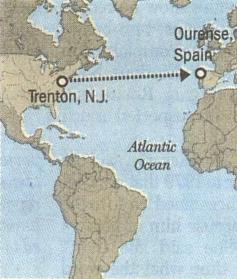 |
He remains a member of the Trenton Diocese. Officials there won't discuss his continued ministry or whether they told the Spanish church about allegations he had inappropriately touched a teenage girl decades ago. Those complaints had led to his 2002 removal.
Monsignor Fernández said in a phone interview that he left for the Diocese of Ourense, Spain, to live out his retirement. He denied that he was accused in Trenton, even though the diocese continues to publish on its Web site a news release about his case.
Ourense Bishop Luis Quinteiro refused to answer written questions about Monsignor Fernández. "I am unaware of what right you have to send me these questions," he replied.
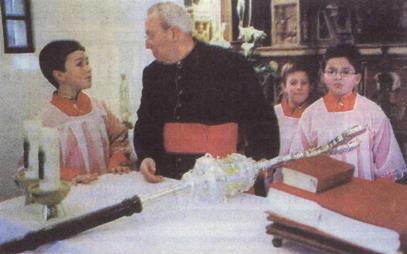 |
| The Rev. Manuel Fernández said he went to Ourense, Spain, to retire, not because he was accused of touching a teenage girl in Trenton, N.J. Photo by Xulio Villarino / Special Contributor. |
The Rev. Paul Madden
Admitted abuser stays abroad and employed
U.S. fails to enforce 'zero tolerance,' then lets him join Peru church
The Diocese of Jackson, Miss., says it is living up to the U.S. church's "zero tolerance" policy. But Bishop Joseph Latino won't discuss how the Rev. Paul Madden, despite admitting abuse of a 13-year-old boy in the 1970s, has stayed in ministry.
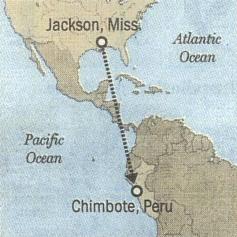 |
Father Madden had worked as a missionary in South America for many years when the Jackson Diocese, in late 2003, let him become a full-fledged member of Peru's Diocese of Chimbote – a move that put him beyond the reach of the new policy.
The Peruvian leader who worked the longest with Father Madden, Bishop Luis Armando Bambarén, said he accepted him because he thought the accuser had recanted. The bishop would not elaborate. The victim received a settlement payment and did not recant, his family said.
The Boston-based Society of St. James the Apostle, which once listed Father Madden as a member and used to operate the parish where he is stationed, did not return messages.
Father Madden said in a recent phone call that he had lost his voice and could not be interviewed. He is undergoing vocal cord therapy in Europe, Chimbote officials said.
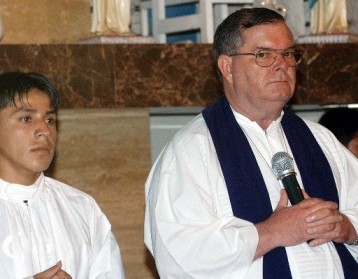 |
| The Rev. Paul Madden said in a phone call that he had lost his voice and couldn't be interviewed. He is said to be undergoing vocal cord therapy. Photo by Paolo Aguilar / Special Contributor. |
The Rev. Carl Tresler
Despite warning on priest, Vatican won't act
LA cardinal says he also advised bishop in Peru that Tresler should not
be allowed to serve as priest
Los Angeles Cardinal Roger Mahony barred the Rev. Carl Tresler from ministry in the late 1990s after a teenage boy accused the priest of abuse. Father Tresler denied the allegation and moved to Huancavelica, in the mountains of Peru, where he is a pastor, seminary boss and diocesan administrator.
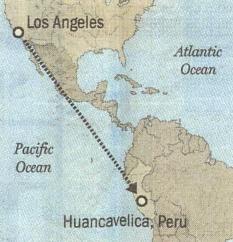 |
Cardinal Mahony has written the bishop there and the Vatican warning "that Father Tresler should not be permitted to function as a priest anywhere," according to a Los Angeles Archdiocese report. But it's done no good.
Vatican officials did not respond to requests for comment. Huancavelica Bishop William Molloy, formerly a priest in Alabama, recently suffered a stroke and was unavailable for comment. Bishop Isidro Barrio, who is currently running his diocese, could not be reached.
Cardinal Mahony initially allowed Father Tresler to join the Peruvian diocese. The priest said he was unfairly targeted only later, after the cardinal was criticized for handling other allegations.
Father Tresler said the cardinal's letters to the bishop and the Vatican have gotten no results because he hasn't been believed. "I don't think [Cardinal Mahony] lives in reality," he said.
 |
A spokesman said the cardinal, if he had it to do over again, would ask the Vatican to expel Father Tresler from the priesthood. But now he lacks the standing to ask, the spokesman said.
The Revs. José
Luis Urbina and Gerardo Beltrán
Mexican bishops refuse to act on substantiated
abuse allegations against pastors
One California fugitive admits guilt in molestation; the second fled before
fondling charges were filed
The Sacramento, Calif., Diocese warned Mexican bishops over a decade ago about substantiated abuse allegations against two of its priests, who fled California criminal cases. Yet the men are pastors in their native Mexico today – and still fugitives.
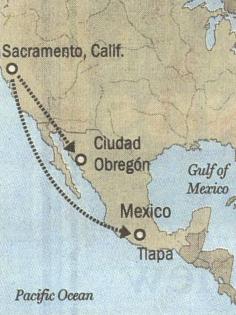 |
One is the Rev. José Luis Urbina, who jumped bail in 1989 after being convicted of molesting a teenage boy and before he could be sentenced. He admitted guilt in court and in a recent phone interview from his church, in the northwestern Mexico city of Navojoa.
His longtime boss there, Ciudad Obregón Bishop Vicente García, said he was unaware of the conviction and thought "this was something where the statute of limitations had run out." Church records show that Sacramento told Bishop García about the conviction in writing and sent someone to tell him in person.
Father Urbina said that he told the bishop "everything that had happened" and that he had successfully undergone psychotherapy in California.
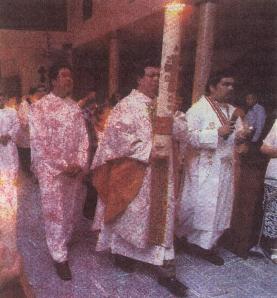 |
| The Rev. José Luis Urbina jumped bail in 1989 after he was convicted of molestation. Photo by Erich Schlegel / Staff Photographer. |
The second fugitive, the Rev. Gerardo Beltrán, went to Mexico in December 1991 as Sacramento police began investigating abuse allegations against him. He soon was charged with fondling two young girls.
Father Beltrán now is a pastor in the village of Igualita, in a remote part of southern Mexico. He declined to comment. His boss for the last seven years, Tlapa Bishop Alejo Zavala, said he was unaware of the criminal case; a bishop who previously supervised Father Beltrán in another Mexican diocese has died.
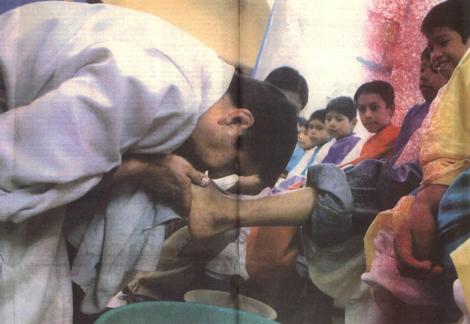 |
| The Rev. Gerardo Beltrán, shown washing and kissing the feet of children dressed as the Twelve Apostles at Mass in a southern Mexico village, left California in 1991 when police began investigating abuse allegations. Photo by Erich Schlegel / Staff Photographer. |
Both priests have refused church orders to return and are dangerous, a spokesman for Sacramento Bishop William Weigand said. In a pending lawsuit, Father Urbina is accused of threatening his victim with a gun.
The spokesman said Sacramento has no record of allowing the priests to
join their new dioceses. He said the bishop has not asked the Vatican
to expel them from the priesthood. Prosecutors have not sought to get
either fugitive returned to California, citing poor extradition relations
between the United States and Mexico.
The Rev. Javier Gutiérrez
Banned from ministry here, he went south
Ex-Alaska priest resumes work in Mexico, says he's 'paid enough'
When the U.S. church toughened its abuse policies, Juneau, Alaska, Bishop Michael Warfel announced that he was banning the Rev. Javier Gutiérrez from ministry because of sexual misconduct with girls in the 1980s. But the priest has stayed on duty in Tijuana, Mexico, where he'd been sent on loan soon after the abuse.
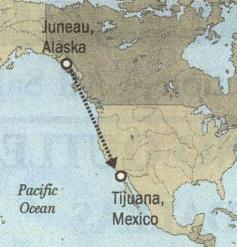 |
An aide to Bishop Warfel said his 2002 announcement "turned out to be inaccurate" because by then Tijuana had made Father Gutiérrez a full-fledged member of that diocese. Tijuana Bishop Rafael Romo declined to be interviewed and did not respond to written questions.
Father Gutiérrez told The Dallas Morning News he had
abused no one and wouldn't have been accepted in Tijuana if he had. He
has previously been quoted as saying, "I had hoped that since I went
for rehab and because I left the United States, people would say, 'Well,
he has paid enough for what he did.' "
The Rev. Abraham Anthony
Fugitive from N. Dakota turns to overseas dioceses
He worked in Australia before going to India
He had lost his priestly authority after fleeing North Dakota police in 2000 and could not minister anywhere, declared Fargo's new bishop, who vowed to get tough with abusers. In fact, the fugitive has since found work in three overseas dioceses – including one in Australia led by a reform-minded leader.
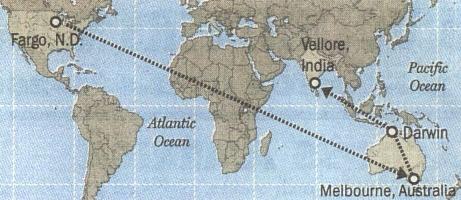 |
First came Melbourne, which says the Rev. Abraham Anthony's home bishop in India didn't disclose that the priest was wanted on charges he abused three boys in the U.S. It soon dismissed him over "theological differences," a church leader said.
Next was Darwin, whose bishop served on an Australian panel studying how to prevent abuse. Without doing a background check, he let Father Anthony take a group of children to World Youth Day in Canada in 2002.
"When a bloke's supposed to be healing people and wants to come in and help – and he's worked in one diocese already – you sort of don't ask too many questions," Bishop Edmund Collins said.
Father Anthony now works at a parish in southern India's Vellore Diocese, where he grew up. He denied the criminal charges and told a reporter that he fled Fargo under pressure from its former bishop, who church officials said is too ill with Alzheimer's disease to be interviewed. Current Fargo Bishop Samuel Aquila declined to be interviewed about the priest.
Vellore Bishop A. Malayappan Chinnappa said he was unaware of the U.S. charges. The priest formally belongs to the Diocese of Simla-Chandigarh, whose bishop could not be reached for comment.
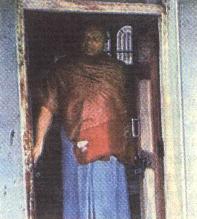 |
| The Rev. Abraham Anthony works in southern India's Vellore Diocese. |
The Rev. Jean-Level Eliscard
Haitian bishop helps convict get Canadian jobs
Montreal cardinal removes abuser after learning of his past from The News
Many Canadian bishops have had "zero tolerance" rules in place since the 1990s, well before U.S. bishops adopted their policy in 2002. The Canadians say they demand detailed background information from all job applicants and reject anyone who's been accused of abuse.
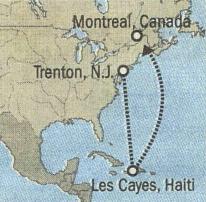 |
So why did the Montreal Archdiocese hire the Rev. Jean-Level Eliscard in 2003? The Haitian priest had been convicted in 1995 and sentenced to probation for sexually abusing a 13-year-old parishioner in New Jersey. The case drew heavy regional news coverage at the time because of its sensational details: The victim's father had caught Father Eliscard on top of the crying girl, with her hands pinned and dress pulled up. While under criminal investigation, the priest tried to flee to Haiti but was arrested at a New York airport.
A spokesman for Montreal's cardinal said Father Eliscard was accepted on the recommendation of Bishop Jean Alix Verrier, who heads the priest's home Diocese of Les Cayes, Haiti. Bishop Verrier did not disclose that Father Eliscard had even worked in the United States, according to Montreal and a neighboring diocese where the abuser also worked. Bishop Verrier could not be reached for comment.
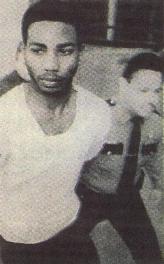 |
| The Rev. Jean-Level Eliscard was convicted of sexually abusing a girl, 13, in New Jersey. Photo by Tom Kelley / The Trentonian. |
Father Eliscard was working as a hospital chaplain when The Dallas Morning News located him late last year. He declined to comment. The cardinal removed him from duty shortly after inquiries from the newspaper.
Any original material on these pages is copyright © BishopAccountability.org 2004. Reproduce freely with attribution.